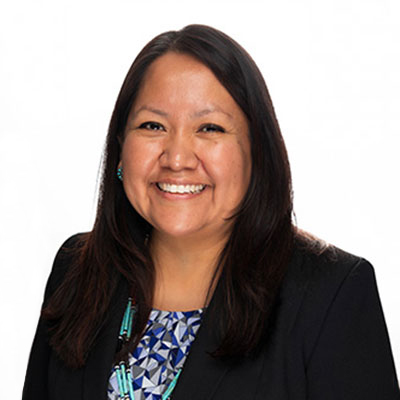Patterson Earnhart Real Bird & Wilson LLP is pleased to announce the Navajo Nation Bar Association (NNBA) elected partner Alvina Earnhart as President for a two-year term. Also, on May 13, 2022, she was appointed Chairperson of the Colorado State Advisory Committee for the U.S. Commission on Civil Rights (Commission) for a second term.
About Alvina Earnhart
Earnhart is a founding partner of Patterson Earnhart Real Bird & Wilson LLP with more than 15 years of legal experience specializing in Federal Indian law.
Originally from Coyote Canyon (Brimhall), New Mexico, she is an enrolled member of the Navajo Nation, born from the Kin ł ichii’nii – Red House People clan and born for the Bit’ahnii – Folded Arms People clan. Her maternal grandfather’s clan is Haltsooi – Meadow People, and her paternal grandfather’s clan is Tsi’naajinii – Black Streak Wood People.
Navajo Nation Bar Association
Founded in 1975 and based in St. Michaels, Arizona, the NNBA is the largest legal services organization in the United States, with more than 500 members. The NNBA was established to promote law practice in the Navajo Nation, recommend candidates for admission to practice law before the Navajo Courts, and establish and ensure the quality of training programs for practitioners.
The NNBA also advises on the selection of judges in the Navajo Courts, counsels the Courts on rule changes and other measures, and recommends legislation to enhance the Navajo Court system. The Navajo Nation spans parts of three states and is larger than West Virginia.
U.S. Commission on Civil Rights
The U.S. Commission on Civil Rights, established by the Civil Rights Act of 1957, is the only independent, bipartisan agency charged with advising the President and Congress on civil rights and reporting annually on federal civil rights enforcement. The 56 State and U.S. Territory Advisory Committees offer a broad perspective on civil rights concerns at state and local levels.
The Advisory Committees have recently examined water affordability, school discipline disparities, policing practices, mental health and the criminal justice system, legal financial obligations, fair housing, hate crimes, voting rights, maternal health, and solitary confinement. In addition to advising the Commission, Advisory Committee reports have contributed to policy changes at the national, state, and local levels.

